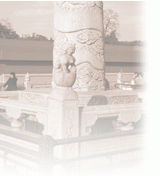| Chinese Dragon & American Eagle Must Find Language of Cooperation: Kissinger |
| 2004-06-12 15:27 |
|
In most cases, the disharmony between the two
countries can be traced to their different approaches in
dealing with foreign affairs. China and the United States must find a perspective to share a language of cooperation to build stable bilateral relations, said Henry A. Kissinger yesterday in Beijing. In most cases, the disharmony between the two countries can be traced to their different approaches in dealing with foreign affairs, Kissinger said to an audience composed of the world-rank media tycoons and political celebrities coming to China for the 7th annual meeting of the International Council of Museum of Television and Radio (MT&R). A famous international relations expert and the 56th Secretary of State of the United States from 1973 to 1977, Kissinger is better known to Chinese for his legendary secretive visit to China in 1971, which had paved the road for then US President Richard Nixon's meeting with Chinese Chairman Mao Zedong in 1972 and led to the normalized diplomatic relations between the two countries. "In the west, especially the United States, we think of foreign policies in terms of personalities and how two leaders get along with each other," he said. But China has a tendency to deal with the international affairs in a much more long-range basis than most Western countries, especially the United States. The typical approach of an American foreign policy is to take the problem, assuming it has a conclusion and can be resolved with a great deal of time, get somebody to an agreement, and go on to another problem, said Kissinger, also a member of the Advisory Committee's Presidium of the MT&R International Council. "Our approach is dominated by lawyers, who deal with cases," he said. But Chinese approach is based on concepts in which equilibrium plays important role. "Westerners tend to think that if you have dispute, you can settle it by arbitration in accordance with some legal principles," he said. "Chinese tend to think that if you have a dispute, its resolution depends on an underlined relationship." Different foreign affairs approaches have laid some snags between the two countries, ranging from the Taiwan issue, human rights quarrel, and technology trade disputes. "The present relationship between China and the United States is a test of both sides' ability to deal with the problem of the 21st century," Kissinger said. "This is a test for China because it has never had before in its long history to deal with global foreign policy over an extended period of time. It's a test for America, because it's important for America to understand what the issue is." As an example, he mentioned the so-called "China threat" theory. "There is a school of Americans who believe that China, because it is developing in such an extraordinary rate, is bound to become a threat of the United States. Therefore, it's not sensible to try to have a constructive relationship, because sooner or later, they will have to get into confrontation with China," he said. But this is not the approach that will really work, he said. "I don't think it realistic to prospect (that) as China becomes stronger, its military capacity will also grow," Kissinger said. "It is important for us to remember that the total Chinese military budget in this time is less than the annual interest of the United States military budget. So, at this rate, the possibility of a military global challenge from China to the United States is simply not realistic in military terms. But it's also not realistic because the war between two countries at this magnitude will be a disaster to civilization and stability everywhere." Kissinger thinks Uncle Sam should freshen his mindset in its foreign affairs approach. "United states is the most powerful country in the world, but the number of issues that can be dealt with military means is shrinking, not increasing," he said. "What I want to stress is that in my experience the issues between China and Untied States have always in the end been settled by consultation." |
|
||||||||||
 |
||||||||||
|
| ||||||||||
|
| ||||||||||
 | ||||||||||
 | ||||||||||
 |
| Home > News | |
|
|
|